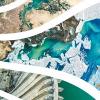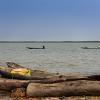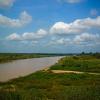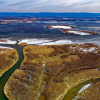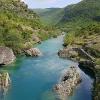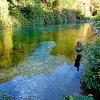Water Convention Press Releases
Displaying Results 51 - 75 of 145
Joining the Convention on the Protection and Use of Transboundary Watercourses and International Lakes (Water Convention) makes a difference! Parties to the Water Convention constantly advance water cooperation at the basin, subbasin and bilateral levels. The conclusion of at least 10 new
Results of the second Sustainable Development Goal (SDG) report on transboundary water cooperation, published today by UNECE and UNESCO (co-custodian agencies for SDG indicator 6.5.2) on behalf of UN-Water, suggests that not nearly enough operational arrangements for transboundary water cooperation
On 16 June, Guinea-Bissau became the 4th African country (45th party) to accede to the Convention on the Protection and Use of Transboundary Watercourses and International Lakes (Water Convention), whose secretariat is provided by UNECE. It is also a party to the Convention
Ghana’s transboundary river basins, namely the Volta River basin (shared with Benin, Burkina Faso, Côte d’Ivoire, Mali and Togo – home to over 23 million people, with a population projected to more than double by 2050), Bia and Tano Rivers (shared with Côte d’Ivoire) and Todzie-Aka basin (shared
The use of material resources, fuelled by economic and population growth, urbanisation and societal changes, has increased more than ten times since 1900 and is set to double again by 2030. The annual global extraction of materials has increased from 27 to 92 billion tonnes since 1970, while the
Across the world, 153 countries share rivers, lakes and aquifers. Transboundary basins cover more than half of the Earth’s land surface, account for an estimated 60 per cent of global freshwater flow and are home to more than 40 per cent of the world’s population. Transboundary water cooperation is
Albania and Montenegro have agreed to establish a joint technical working group on “Monitoring & assessment” and to develop and implement an information exchange protocol to operationalize their cooperation on the shared Cijevna/Cem
Economic and social development in Albania crucially depends on the availability and good quality of water, land, forest and environmental resources, which are, however, under increasing pressure, including from climate change. An online consultation on the Water-Energy-Food-Ecosystems Nexus in
Covering an area of approximately 1 million km2, the North Western Sahara Aquifer System (NWSAS) basin is an essential water resource for 4.6 million people in Algeria, Tunisia and Libya (2.04 million in Algeria, 1.48 million in Libya, 0.7 million in Tunisia).
With an estimated groundwater
“Sustainable Development Goal 6 on water and sanitation for all is badly off track. This is hindering progress on the 2030 Agenda, the realization of human rights and the achievement of peace and security around the world. Water and sanitation cut across all three pillars of the United
Shared among Albania, Greece, Kosovo*, Montenegro and North Macedonia (the five ‘Riparians’), the Drin River Basin provides water resources for drinking, energy, fishing and agriculture, biodiversity, tourism and industry. The Strategic Action Programme (SAP) for the sustainable management of
Water is crucial for climate change adaptation and mitigation, as well as health, hygiene, sustainable development and life. The global climate crisis is inextricably linked to water.: 90% of all disasters are water-related. Over two billion people live in countries experiencing high water
Today, the Republic of Montenegro officially becomes the 27th Party to the Protocol on Water and Health, thus joining countries effectively working together within the framework of the Protocol to accelerate action on sustainable management of water resources and improve health and well-being
Montenegro is to become the 27th Party to the Protocol on Water and Health in the next months and 8 other pan-European countries confirmed that they are on their way to accession!These announcements came as more than 225 participants from 40 countries gathered in Belgrade for the 5th
Ensuring equitable access must be central to efforts to realize the basic human rights to water and sanitation. However, despite significant progress in the provision of water and sanitation in the pan-European region, the latest data of the WHO/UNICEF Joint Monitoring Programme for Water Supply
Water management must play a central role in adapting to the worst effects of climate change and reducing greenhouse gases, according to a new UN-Water Policy Brief.Released in the context of the Climate Action Summit and the opening of the 74th UN General Assembly in New York, the brief argues
Political authorities and water stakeholders from all over the world will gather in Dakar in March 2021 for the ninth World Water Forum under the theme "Water Security for Peace and Development". The Forum, co-organized by the Government of Senegal and the World Water Council, will for the first
On 19 November 2018, the Foreign Affairs Council of the European Union (EU) adopted new conclusions on Water Diplomacy which underline the link between water, security and peace and promote accession to and implementation of the Convention on the Protection and Use of Transboundary Watercourses
The majority of disasters are water-related, either directly or indirectly. Over the past twenty years, there has been a sustained rise and frequency in the number of climate-related disasters such as floods and droughts. When disasters take place, access to water can be severely restrained
Since its adoption over 25 years ago, the Convention on the Protection and Use of Transboundary Watercourses and International Lakes (Water Convention) has supported transboundary water cooperation across the pan-European region. Through a newly introduced reporting mechanism, Parties are now
Understanding the interactions between water, food, energy and water-related ecosystems in river basins can be vital in ensuring different and often competing needs are met in a coherent manner. This is even more important in transboundary basins, where identifying intersectoral synergies and
Across the world, 153 countries share rivers, lakes and aquifers. Transboundary basins cover more than half of the Earth’s land surface, account for an estimated 60 per cent of global freshwater flow and are home to more than 40 per cent of the world’s population. Transboundary water cooperation
On 6 March the Compliance Committee of the Protocol on Water and Health initiated a consultation with Estonia, Latvia and Lithuania to support those countries in their efforts to improve their water and health situation and deal with emerging challenges by setting national targets under the
In the Drina River Basin, shared mainly by Bosnia and Herzegovina, Montenegro and Serbia, addressing water pollution and improving water quality and monitoring have emerged as key dimensions of the challenges of ensuring sustainable development in a transboundary context. These are among the
The International Water Assessment Centre (IWAC), the collaborative centre of the Convention on the Protection and Use of Transboundary Watercourses and International Lakes (Water Convention), was launched today in Astana, Kazakhstan.The Centre, which the Kazakh Government will be hosting in
